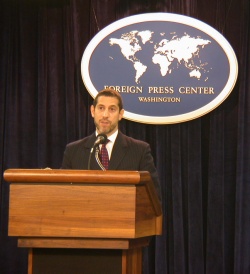Difference between revisions of "Bruce Hoffman"
(profile expanded) |
m (name added to cat.) |
||
| Line 46: | Line 46: | ||
<references/> | <references/> | ||
| − | [[category:Terrorologist]] | + | [[category:Terrorologist|Hoffman, Bruce]] |
[[category:Terrorexpertise]] | [[category:Terrorexpertise]] | ||
Revision as of 16:49, 26 May 2008
Bruce Hoffmann is a prominent terrorism expert for a long time associated with the RAND Corporation. He was a founding director of the the Centre for the Study of Terrorism and Political Violence at the University of St. Andrews, and is currently a professor at Georgetown University’s Edmund A. Walsh School of Foreign Service.
Contents
Education
- A.B. (1976) Connecticut College, Government, History
- B. Phil. (1978) Oxford University, International Relations
- D. Phil. (1986) Oxford University, International Relations
Career
RAND Corporation
Hoffman must have joined RAND prior to completing his higher education because he authored a report for RAND called Right-wing terrorism in Europe in 1982, four years before he was awarded his doctorate. Hoffman authored several reports for RAND during the late 1980s, and when Brian Jenkins left in 1989, Hoffman took over the RAND Terrorism Chronology Database which Jenkins had developed. Hoffman assumed directorship of the programme and expanded the database to include domestic as well as international terrorism.[1]
St. Andrews
In November 1994, the Director of Central Intelligence awarded Hoffman the United States Intelligence Community Seal Medallion; the highest level of commendation given to a non-government employee.[2] That year Hoffman left the RAND staff to set up the Centre for the Study of Terrorism and Political Violence at the University of St. Andrews. Hoffman became director of the centre as well as becoming chairman of the Department of International Relations at St. Andrews. Hoffman worked alongside Paul Wilkinson who was Chairman of the Centre, and assumed Hoffman’s responsibilities after his departure. At St. Andrews Hoffman continued to consult for RAND and others, and to edit the academic journal Studies in Conflict and Terrorism.[3]
Back to RAND
On 31 August 1998 RAND announced that Hoffman was to become director of its Washington Office, effective from January 1999.[4] From 2001 to 2004, Hoffman was RAND’s Vice President for External Affairs and in 2004 he also was Acting Director of RAND’s Center for Middle East Public Policy. Hoffman’s last positions at RAND were as Corporate Chair in Counterterrorism and Counterinsurgency, Director of the Washington office and Senior International Policy Analyst.[5]
Advising the Occupation in Iraq
Hoffman was adviser on counterterrorism to the Office of National Security Affairs, Coalition Provisional Authority in Iraq during the spring of 2004. From 2004-2005 he was an adviser on counterinsurgency to the Strategy, Plans, and Analysis Office at Multi-National Forces-Iraq Headquarters, Baghdad.[6] Hoffman argued that the occupation strategy can be successful only if it adopts a British colonial model of counter-insurgency, comparable to perspectives in Frank Kitson's Low Intensity Operations. Hoffman had compared American Imperialism with its British predecessor in his early writings. In 1983 Bar-Ilan University Press published Hoffman’s book The failure of British military strategy within Palestine, 1939-1947. A year later he compared the British colonial experience with the American presence in Lebanon in a RAND report he authored called The siege mentality in Beirut: an historical analogy between the British in Palestine and the Americans in Lebanon.
Georgetown University
On 12 July 2006 it was announced that Hoffman would join Georgetown University’s Edmund A. Walsh School of Foreign Service[7] where he is currently professor in the Security Studies Program.
Affiliations
- Centre for the Study of Terrorism and Political Violence, Founding Director
- Conflict and Terrorism, Editor-in-Chief
- Council on Global Terrorism, member
- Council on Foreign Relations, member
- International Institute for Strategic Studies, member
- Royal United Services Institute, member
- Woodrow Wilson International Center for Scholars, Senior Scholar
- National Security Studies Center (University of Haifa), a Senior Fellow
- Institute of Defence and Strategic Studies (Nanyang Technological University), Visiting Fellow
- Combating Terrorism Center (West Point Military Academy), Senior Fellow
- Human Rights Watch, member of the Advisory Committee of the Terrorism and Counterterrorism Program
Contact information
- Tel: 202-687-7847
- Email: brh6@georgetown.edu
Notes
- ↑ RAND Corporation News Release, 'BRUCE HOFFMAN TO HEAD RAND’S WASHINGTON OFFICE. LEADING TERRORISM EXPERT RETURNS AS THINK TANK BEEFS UP PROGRAM. ALSO BACK AT RAND: BRIAN JENKINS', 31 August 1998
- ↑ Georgetown University Edmund A. Walsh School of Foreign Service, FACULTY & STAFF: Bruce Hoffman
- ↑ RAND Corporation News Release, 'BRUCE HOFFMAN TO HEAD RAND’S WASHINGTON OFFICE. LEADING TERRORISM EXPERT RETURNS AS THINK TANK BEEFS UP PROGRAM. ALSO BACK AT RAND: BRIAN JENKINS', 31 August 1998
- ↑ RAND Corporation News Release, 'BRUCE HOFFMAN TO HEAD RAND’S WASHINGTON OFFICE. LEADING TERRORISM EXPERT RETURNS AS THINK TANK BEEFS UP PROGRAM. ALSO BACK AT RAND: BRIAN JENKINS', 31 August 1998
- ↑ Georgetown University New, ‘Terrorism Expert Bruce Hoffman Joins Faculty’, 12 July 2006
- ↑ Georgetown University Edmund A. Walsh School of Foreign Service, FACULTY & STAFF: Bruce Hoffman
- ↑ Georgetown University New, ‘Terrorism Expert Bruce Hoffman Joins Faculty’, 12 July 2006
